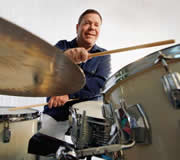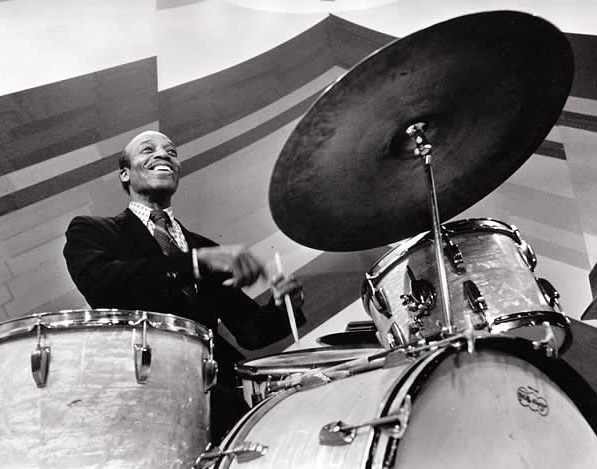Norman Mailer’s 50th Birthday Party
Monday, December 1st, 2008JazzLegend.com friends:
Herewith is a chapter of a new book in progresss, with the working title of “Life with the Legends: Walking with the Showbiz Icons.” This segment is representative of a pretty singular instance, in one opinion anyway, and concerns how I got invited to the famed, 50th birthday celebration that the late literary icon, Norman Mailer, threw for himself in February of 1973. It was quite a night. Enjoy!
From 1971 to 1973, pianist/record producer Andy Kahn and yours truly performed in a musical group that we had the nerve to call “The All-Star Jazz Trio.” Kahn and I had been playing together since we were kids, with me on drums, and a number of bass players. By the time we turned 18, we had become decent jazz players. Well, enthusiastic ones anyway.
In 1971, there was virtually no live jazz to be heard in center city Philadelphia, but that didn’t stop us from approaching a restaurant/club– called “Skewers” and located on tony Rittenhouse Square–about presenting live jazz several nights a week. If memory serves, Andy Kahn played solo piano the first night, I brought my drums down–for free–the next night, and the following night a bass player who had been enjoying us from the bar joined us. We were booked five nights per week, and it didn’t take long for the whole enterprise to pick up steam.
All the real and wannabe jazz fans came out of hiding to hear these rambunctious, 18-year-olds, if only because Philadelphia jazz fans had nowhere to go after the demise of clubs like Peps, the Showboat and New Jersey’s Red Hill Inn. It didn’t take long for musicians to get the word about the action, and we had our share of well-known “sitters in,” including Pepper Adams and Jerry Dodgian of the Thad Jones/Mel Lewis Jazz Orchestra, pianist Bernard Peiffer, Ronald Reuben and Glenn Dodson of the Philadelphia Orchestra (we later recorded with Reuben and Dodson), and on one evening, just about half of the Woody Herman Orchestra. We even hired our own press agent, who made sure our names appeared in the gossip columns regularly in exchange for a $25 per month fee.
Supporting us through the years in our musical endeavors was a dear, dear friend, who left us much too soon some years ago, named David Kay. Kay was not a jazz musician. He was a fan and listener who was exposed to the real stuff in New York City at a young age. His mother was jazz singer Carol Stevens, who recorded several impressive projects for Atlantic Records backed by the likes of Herbie Mann; did very well on the New York jazz club scene; and got some great write-ups in the trades and even in Time magazine. Since 1969, Stevens had been living with Norman Mailer, the literary giant and larger-than-life personality who passed away on November 10th of last year at the age of 84.
Always the publicity hound, which is why Mailer was as much a “personality” as he was a writer, he decided in February of 1973 to throw himself a 50th birthday bash. But this would be no mere party. It would be held at the Four Seasons hotel in New York City with 550 of Norman Mailer’s closest friends as invitees. In true Mailer style, he decreed that each and every one of the 550 people invited would have to pay $30 per person (then a hefty fee) to attend the bash. Evidently, all or most of them paid up, and the guest list included some major names, like Shirley MacLaine, Muhammad Ali and then-Senator Jacob Javits. A couple of somewhat lesser names were also on the guest list, courtesy of David Kay and his mother. Those names were Andy Kahn and Bruce Klauber. And we didn’t have to pay the $30 admission fee.
I have no recollection of just how we got to New York. I suspect it was either in Kahn’s Fiat or my Vega. However we did get there, what we witnessed upon our arrival at The Four Seasons was absolutely incredible. People were jammed in everywhere, and there were big stars at every turn. The crowd was buzzing in anticipation of Mailer’s remarks that were to be made later that evening. He was supposed to be saying something of major, international consequence (long-time Mailer foe Gore Vidal once commented that everything Mailer ever said in public was supposed to be of major consequence).
Kahn and I were greeted by our friend David Kay, his mother, and surprise of surprises, the “Man of the Hour” in person. Mailer was quite gracious, and said something to the effect that he heard of the fine work we were doing as young jazz musicians, and that he understood us to be “quite talented.” I don’t remember whether or not he patted us on the head.
Then the music began, and this was music of the real, all-star variety. The players included baritone saxophonist Pepper Adams, who had kind of taken Andy and I under his wing when he played with us in Philadelphia; composer/multi-instrumentalist David Anram; and the legendary bassist /composer Charles Mingus. Pepper Adams tried to make us feel comfortable and at home. I think he realized that one of us–that would be me–was in way over his head that night. Andy Kahn, who had been in show business since childhood, was not in over his head. He was in his element.
One of the many real novelties of the evening had to do with just how the food was served. This night, guests were invited to get whatever they wanted–from desserts to appetizers to entrees–direct from The Four Seasons kitchen and eat in the kitchen if they so desired. None other than Charles Mingus himself made sure that Andy and Bruce, the two young jazzers from Philadelphia, were escorted properly into the Four Seasons kitchen. Mingus suggested that we all dine on apple pie, which he deemed “the best in the world.” It was, and the Charles Mingus who was said to be among the most volatile personalities in the music world, was not on view that evening.
Then it was time for the birthday boy’s big speech, the one that would be of major, international consequence. Mailer sauntered up to the microphone in front of 550 adoring fans. It soon became clear, however, that the honoree may have downed too many bourbons too quickly.
The notoriously anti-feminist Mailer began his remarks thusly: “A lot of people ask me,” he said after the applause had died down after his introduction, “why I associate with so many worn-out, older women. Well, I’ll tell you why. Because they’re all the same once you get past the old, worn-out part.” Hoo boy. And that was just the start of it.
His remarks only went further downhill from there. Mostly, he was rambling semi-incoherently, and the portion that was supposed to be of major consequence had vaguely to do with a citizen’s agency that he wanted to set-up to investigate the CIA. He called it “The Fifth Estate,” or something like that.
The evening seemed to slowly deflate after that, but the partying, eating and drinking continued long into the night, though not with the same fervor. I was ready to leave. Andy Kahn, bless his heart, wanted to stay until morning.
I again have no recollection as to when we got back to Philadelphia and how we got there. What I did know was that we had a singular experience that defined jazz and defined New York City during those great days.
I wish I had a photograph of that night, but I do have one memento. Our press agent certainly worked overtime for us in this case. A day or two after the party, an item appeared in the entertainment column of the Philadelphia Inquirer that read in part, “Andy Kahn and Bruce Klauber of The All-Star Jazz Trio playing at Skewers, were Philadelphia representatives and invited guests at Norman Mailer’s 50th birthday party held at New York CIty’s Four Seasons hotel.”
It’s true. I still have the press clipping. Andy and Bruce were, indeed, there.






